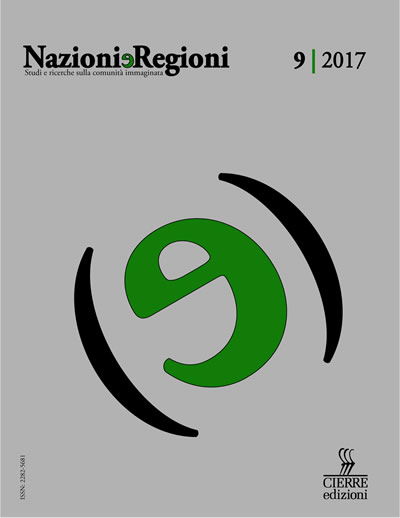Linguaggi di nazione. Le «esperienze di nazione» e i processi di nazionalizzazione: proposte per un dibattito<br><br>Languages of nation. The «experiences of the nation » and the nationalization processes: some proposals for debate
DOI:
https://doi.org/10.15162/2282-5681/1458Parole chiave:
nazionalismo, nazionalizzazione, identità, esperienza, storia sociale, nationalism, nationalization, identity, experience, social historyAbstract
Questo articolo presenta alcune riflessioni circa la possibilità di elaborare un orizzonte teorico e concettuale per la storia sociale dei processi di nazionalizzazione. Per questo si propone di affrontare il concetto di esperienza di nazione a partire dai dibattiti che in storia sociale e culturale hanno messo in crisi la definizione di esperienza. Attraverso la doppia prospettiva della narrazione dell’identità costruita e della storia della vita quotidiana, propone l’idea delle esperienze di nazione come continuum utilizzando come riferimento l’ambito dello spazio sociale.
This article presents some reflections on the possibility of developing a conceptual and historical theoretical framework for a social history of the nationalization process. To do this, it is proposed to discuss the concept of « experiences of the nation », based on the debates that in social and cultural history have questioned the very concept of experience. Through a dual perspective, narratively constructed identity and history of everyday life, it proposes the idea of nation experiences as a continuum, taking the idea of social spaces as an axis.
Riferimenti bibliografici
Anderson B. (1983), Imagined Communities: Reflections on the Origin and Spread of Nationalism, Verso, London.
Agulhon M. (1983), Les citadins et la politique, in Duby G. (ed.), Histoire de la France Urbaine, t. 4. La ville de l’Âge industriel, Seuil, Paris.
Archilés F. (2007), ¿Experiencias de nación? Nacionalización e identidades en la España restauracionista (1898-1920), in Moreno Luzon J. (ed.), Construir España. Nacionalismo español y procesos de nacionalización, CEPC, Madrid, pp. 127-151.
Ariés P. – Duby G. (eds.) (2000), Histoire de la vie privée. 4. De la Révolution à la Grande Guerre, Points, Paris.
Aughey A. (2007), The Politics of Englishness, Manchester University Press, Manchester.
Banti A. M. (2000), La nazione del Risorgimento. Parentela, santità e onore alle origini dell’Italia unita, Einaudi, Torino.
Berger S. (2007), The Power of National Pasts: Writing National History in Nineteenth and Twentieth Century Europe, in Berger S. (ed.), Writing the Nation. A Global Perspective, Palgrave, Basingstoke, pp. 30-62.
Berger S. (2008), Introduction: Narrating the Nation. Historiography and Other Genres, in Berger S. – Eriksonas L. – Mycock A. (eds.), Narrating the Nation. Representations in History, Media and the Arts, Berghahn, New York-Oxford, p. XII.
Berger P. – Luckmann, T. (1966), The Social Construction of Reality. A Treatise in the Sociology of Knowledge, Penguin, London.
Bhabha H. K. (ed.) (1990), Nation and narration, London, Routledge.
Breward C. – Conekin B. E. – Cox C. (eds.) (2002), The Englishness of English Dress, Berg, Oxford-New York.
Billig M. (1992), Talking of the Royal Family, Routledge, London-New York.
Billig M. (1995), Banal Nationalism, Sage Publications, London.
Bonnell V. E. – Hunt L. (eds.) (1999), Beyond the Cultural Turn. New Directions in the Study of Society and Culture, University of California Press, Berkeley.
Brubaker R. et alii (2006), Nationalist Politics and Everyday Ethnicity in Transilvanian Town, Princeton University Press, Princeton.
Colley L. (1992), Britons: Forging the Nation 1707-1837, Yale University Press, New Haven and London.
Cabo M. – Molina F. (2009), «The Long and Winding Road of Nationalization: Eugene Weber’s Peasants into Frenchmen in Modern European History (1976-2006)», in European History Quarterly, 39-2, pp. 264-286.
Cerulo K. A. (1993), Identity Design. The Sights and Sounds of Nation, Rutgers University Press, New Brunswick NJ.
Cohen A. P. (1985), The Symbolic Construction of Community, Routledge, London.
Cohen A. P. (1999), Peripheral Vision. Nationalism, National Identity and the Objective Correlative in Scotland, in Cohen A. P., Signifying Identities. Anthropological Perspective on Boundaries and Contested Values, Routledge, London.
Cohen D. (2006), Household Gods. The British and their Possessions, Yale University Press, New Haven-London.
Confino A. (1997), The Nation as a Local Metaphor: Württemberg, Imperial Germany and Nation Memory (1871-1918), The University of North Carolina Press, Durham NC.
Corbin A. (1998), Le monde retrouvé de Louis-François Pinagot: Sur les traces d’un inconnu (1798-1876), Flammarion, Paris.
Crépin A. (2009), Histoire de la conscription, Gallimard, Paris.
De Certeau M. – Giard L. – Mayol P. (1980), L’invention du quotidien. 2. Habiter, cusiner, Gallimard, Paris.
Dennet D. C. (1979), Are Dreams Experience?, in Dennet D. C., Brainstorms. Philosophical Essays on Mind and Psychology, MIT Press, Cambridge MA.
Douglass M. – Isherwood B. (1980), The World of Goods: Towards an Antrophology of Consumption, Penguin, Harmondsworth.
Dworkin D. L. (1997), Cultural Materialism in Postwar Britain: History, the New Left and the Origin of Cultural Studies, Duke University Press, Durham DC.
Edensor T. (2002), National Identity, Popular Culture and Everyday Life, Berg, Oxford-New York.
Edensor T. (2006), «Reconsidering National Temporalities. Institutional Times, Everyday Routines, Serial Spaces and Synchronicities», European Journal of Social Theory, 9 (4), pp. 525-545.
Eley G. (2005), A Crooked Line: From Cultural History to the History of Society, University of Michigan Press, Ann Arbor.
Elgenius G. (2011), Symbols of Nations and Nationalism. Celebrating Nationhood, Palgrave, Basingstoke.
Elias N. (1989), Studien über die Deutschen. Machtkämpfe und Habitusentwicklung im 19. und 20. Jahrhundert, Suhrkamp, Frankfurt am Main.
Feldman D. – Lawrence J. (2011), «Introduction: Structures and Transformations in British Historiography», in Feldman D. (ed.), Structures and Transformations in Modern British History, Cambridge University Press, Cambridge.
Gellner E. (1983), Nations and Nationalism, Cornell University Press, Ithaca NY.
Giloi E. (2011), Monarchy, Myth and Material Culture in Germany (1750-1950), Cambridge University Press, Cambridge.
Gunn S. (2001), «The Spatial Turn: Changing Histories of Space and Place», in Gunn S. – Morris R. J., Identities in Space: Contested Terrains in the Western City since 1850, Ashgate, Aldershot.
Hall J. A. (ed.) (1998), The State of the Nation. Ernest Gellner and the Theory of Nationalism, Cambridge University Press, Cambridge.
Hall S. (1996), «Who Needs “Identity”?», in Hall S. – Du Gay P. (eds.), Questions of Cultural Identity, Sage, London.
Hobsbawm E. J. (1983a), «Introduction: Inventing Traditions», in Hobsbawm E. J. – Ranger T. (eds.), The Invention of Tradition, Cambridge University Press, Cambridge, pp. 1-14.
Hobsbawm E. J. (1983b), Mass-Producing Traditions: Europe, 1870-1914, in Hobsbawm E. J. – Ranger T. (eds.), The Invention of Tradition, Cambridge University Press, Cambridge, pp. 263-307.
Hobsbawm E. J. (1990), Nations and Nationalism since 1780: Programme, Myth, Reality, Cambridge University Press, Cambridge.
Hoggart R. (1988), A Local Habitation. Life and Times, vol. I (1918-1940), Chatto and Windus, London.
Hroch M. (1985), Social Preconditions of National Revival in Europe. A Comparative Analysis of the Social Composition of Patriotic Groups among the Smaller European Nations, Cambridge University Press, Cambridge.
Jenkins R. (2011), Being Danish: Paradoxes of Identity in Everyday Life, Museum Tusculanum Press, Copenhagen.
Joyce P. (1994), Democratic Subjects. The Self and the Social in Nineteenth Century England, Cambridge University Press, Cambridge.
Karner C. (2007), Ethnicity and Everyday Life, Routledge, London- New York.
Kiernan V. (1978), «Working Class and Nation in Nineteenth Century Britain», in Cornforth M., Rebels and their Causes. Essays in Honour of A. L. Morton, Lawrence and Wishart, London.
Lacapra D. (2004), History in Transit. Experience, Identity, Critical Theory, Cornell University Press, Ithaca MA.
Lefebvre H. (1991), The Production of Space, Blackwell, Oxford.
Lehning J. R. (1995), Peasant and French. Cultural Contact in Rural France during the Nineteenth Century, Cambridge University Press, Cambridge.
Mariot N. (2007), Bains de foule. Les voyages présidentiels en province (1888-2002), Belin, Paris.
Morton G. (2010), «Out of Place», in Griffiths T. – Morton G. (eds.), A History of Everyday Life in Scotland, 1800 to 1900, Edinburgh University Press, Edinburgh.
Miller D. (2008), The Comfort of Things, Polity Press, Cambridge.
Miller D. (ed.) (2011), Home Possessions. Material Culture behind Closed Doors, Berg, Oxford-New York.
Nairn T. (1977) The Break-up of Britain: Crisis and Neonationalism, NLB, London.
Núñez Seixas X. M. (2006), «La construcción de la identidad regional en Europa y España (siglos XIX y XX)», Ayer, 64, pp. 11-231.
Özkırımlı U. (2005), Contemporary Debates on Nationalism: A Critical Engagement, Palgrave Macmillan, Houndmills-Basingstoke-New York.
Perrot M. (2009), Histoire de Chambres, Seuil, Paris.
Quiroga A. (2013), «La nacionalización en España. Una propuesta teórica», Ayer, 90, pp. 17-38.
Reed-Danahay D. (1996), Education and Identity in Rural France, Cambridge University Press, Cambridge.
Rioux J. P. – Sirinelli, J. F. (2002), La culture de masse en France. De la Belle Époque à aujourd’hui, Fayard, Paris.
Scott J. W. (1991), «The Evidence of Experience», Critical Inquiry, 17/4, pp. 773-797.
Scott S. (2009), Making Sense of Everyday Life, Cambridge University Press, Cambridge.
Segal A. J. (2000), «Commercial Immanence: The Poster and Urban Territory in Nineteenth Century France», in Wischermann C. – Shore E. (eds.), Adversting the European City: Historical Perspective, Ashgate, Aldershot.
Seigel J. (2012), Modernity and the Bourgeois Life. Society, Politics and Culture in England, France and Germany since 1750, Cambridge University Press, Cambridge.
Sewell W. H. (1986), «How the Classes are Made: Critical Reflections on E. P. Thompson’s Theory of Working Class», CRSO Working Paper, 336.
Sewell W. H. (2006), Logics of History: Social Theory and Social Transformation, Chicago University Press, Chicago.
Sewell W. H. (1980), Work and Revolution in France: The Language of Labor from the Old Regime to 1848. Cambridge University Press, Cambridge.
Skey M. (2011), National Belonging and Everyday Life. The Significance of Nationhood in an Uncertain World, Palgrave, Basingstoke.
Sommers M. R. – Gibson G. D. (1994), «Reclaiming the Epistemological Other. Narrative and the Social Constitution of Identity», in Calhoun C. (ed.), Social Theory and the Politics of Identity, Cambridge University Press, Cambridge, pp. 38-39.
Stedman Jones G. (1983), Languages of Class: Studies in English Working Class History (1832-1982), Cambridge University Press, Cambridge.
Schwartz V. (1998), Spectacular Realities. Early Mass Culture in “Fin-de-Siècle”, University of California Press, Berkeley.
Thompson E. P. (1963), The Making of the English Working Class, Victor Gollancz, London.
Thompson E. P. (1965), «The Peculiarities of the English», The Socialist Register.
Van Ginderachter M. – Beyen M. (2012), «General Introduction: Writing the Mass into a Mass Phenomenon», in Van Ginderachter M. – Beyen M. (eds.), Nationhood from Below. Europe in the Long Nineteenth Century, Palgrave, Basingstoke, pp. 3-22.
Vincent D. (1989), Literary and Popular Culture, England 1750-1914, Cambridge University Press, Cambridge.
Weber E. (1976), Peasants into Frenchmen. The Modernization of Rural France (1870-1914), Stanford University Press, Stanford.
Whyte W. – Zimmer O. (eds.) (2011), Nationalism and the Reshaping of Urban Communities in Europe (1848-1914), Palgrave Macmillan, Basingstoke.
Williams R. (2008), Who Speaks for Wales? Nation, Culture, Identity, Wales University Press, Cardiff.
Downloads
Pubblicato
Fascicolo
Sezione
Licenza
Nazioni e regioni è una rivista open access che applica la licenza Creative Commons CC BY-NC-ND 4.0 a tutti i contenuti pubblicati.
Nazioni e regioni is an open-access journal that applies the Creative Commons CC BY-NC-ND 4.0 licence to all published contents.







